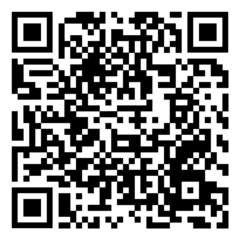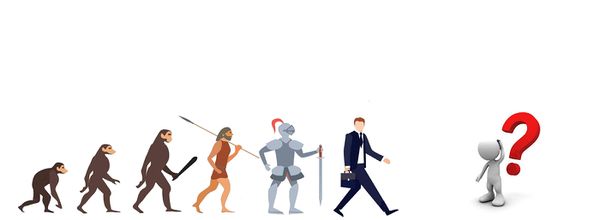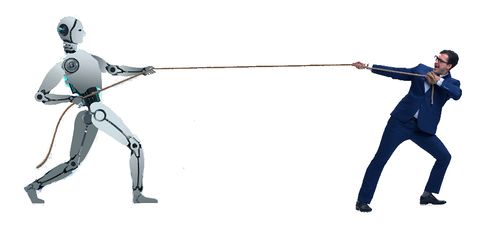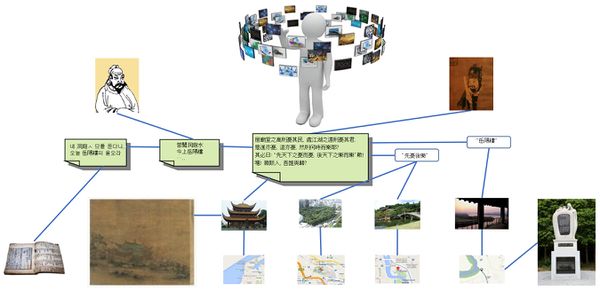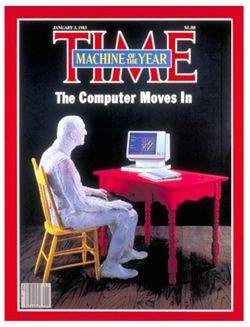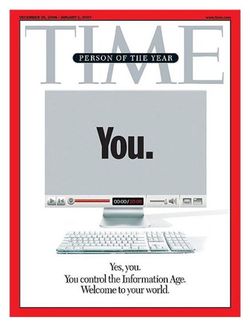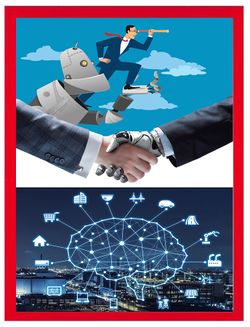"DH Lecture 2021 Oct 27"의 두 판 사이의 차이
(새 문서: <indicator name="music">40px</indicator> '''원광대학교 2021-2 문화•인문콘텐츠학 특강''' 2021. 10. 27. 비대면 온라인 세미나 <center> <font...) |
|||
| 1번째 줄: | 1번째 줄: | ||
<indicator name="music">[[File:text.png|40px]]</indicator> | <indicator name="music">[[File:text.png|40px]]</indicator> | ||
| − | '''원광대학교 2021-2 문화•인문콘텐츠학 특강''' 2021. 10. 27. | + | '''원광대학교 2021-2 문화•인문콘텐츠학 특강''' 2021. 10. 27. 주관: 원광대학교 사학과 |
<center> | <center> | ||
| 20번째 줄: | 20번째 줄: | ||
__TOC__ | __TOC__ | ||
| − | == | + | __TOC__ |
| + | |||
| + | |||
| + | ==1. Introduction== | ||
| + | |||
| + | Humanities education and research activities in the post-human era are called "Digital Humanities." | ||
| + | |||
| + | This lecture is intended to suggest from the perspective of "Digital Humanities" how our cultural activities of exploring and studying traditional cultures can become richer without withering in the post-human era. | ||
| + | |||
| + | ==2. Post-human== | ||
| − | === | + | ===What is Post-human=== |
| − | + | This illustration that you've seen a lot shows the evolution of mankind. Human evolution will not remain in the present but will continue. The part marked by the question mark is the future human - post-human, which will be defined differently from the present human. | |
| − | {|class="wikitable" style="text-align:left;width: | + | [[파일:evolution1.jpg | 600px]] |
| − | | | + | |
| − | + | {|class="wikitable" style="text-align:left;width:90%" | |
| − | + | | | |
| − | + | post-human is one of the themes of today's newly launched social, cultural, and academic discourse. This does not yet have a generally accepted definition, and there is much discussion in the fields of philosophy, literature, art, engineering, and social sciences. | |
| − | + | However, a common background for these discussions is the perception that the environment in which humans live today has changed and that change will accelerate rapidly in the future. | |
| − | |||
| − | |||
| − | |||
| − | |||
| − | |||
| − | |||
| − | |||
| − | |||
|} | |} | ||
| − | + | ===Post-human and AI=== | |
| + | |||
| + | There is a lot of discussion about the changes in the post-human era. One of the main topics of the discussion is "artificial intelligence (AI)." post-human in the future will be human beings living with artificial intelligence. | ||
| + | |||
| + | [[파일:evolution2.jpg | 600px | link=http://dhlab.aks.ac.kr/~tutor/Documents/PDF/2021/PostHumanAndAI.pdf]]<br/> | ||
| + | [http://dhlab.aks.ac.kr/~tutor/Documents/PDF/2021/PostHumanAndAI.pdf How will Humans Evolve in the Future?] | ||
| + | |||
| + | ==3. AI and Cultural Heritage== | ||
| + | |||
| + | ===Cultural Heritage in the AI World=== | ||
| + | |||
| + | Artificial intelligence is already affecting human lives in many areas of our society. Finance, transportation, healthcare, shopping ...... Those influences will be even greater in the future. | ||
| + | |||
| + | By the way, there are certain areas that are still being left out of this artificial intelligence world. One of them is the '''<u>cultural heritage</u>''' of the past that all of us gathered here are deeply interested in. | ||
| + | |||
| + | Why? Most of what happens in modern society are managed and recorded through computer systems. So everything leaves a trace of "data," and that data comes together to form artificial intelligence. | ||
| − | + | However, most of the cultural heritage of the past remains analog materials or records, so computers cannot understand them and use them as data for artificial intelligence. | |
| − | + | ||
| − | + | Do you question whether cultural heritage should be addressed in the world of artificial intelligence? It is human to enjoy cultural heritage, but if the knowledge and information about it are not migrated to the computer-readable data, the valuable asset will be increasingly forgotten in the post-human era. | |
| + | |||
| + | ===Misguided ideas about AI=== | ||
| + | |||
| + | The wrong idea about artificial intelligence is to perceive it as a confrontation against human beings. It is a similar idea that the workers regarded steam engines as an enemy threatening their survival during the First Industrial Revolution. | ||
| + | |||
| + | [[파일:WrongAI.jpg | 500px]] | ||
| + | |||
| + | Artificial intelligence can learn and improve its intelligence only through human-supplied data. | ||
| + | |||
| + | If humans provide distinct and meaningful raw data, artificial intelligence will make reliable decisions and help humans. | ||
| + | |||
| + | On the contrary, if humans provide AI with inaccurate knowledge, ambiguous information, and wrong data, AI will be forced to make wrong decisions, and it will be harmful to humans. | ||
| + | |||
| + | ===Learning Cluture in post-human Era=== | ||
| + | |||
| + | How can we properly teach AI, which will be a partner of post-human, with the knowledge that is meaningful and valuable? | ||
| + | |||
| + | Until now, humans have expressed cultural knowledge in a way that only humans can understand: Languages, sounds, movements that only we humans can understand. | ||
| + | |||
| + | By converting this information into something that computers can understand and interpret, computers can develop into something that helps us a lot more. | ||
| + | |||
| + | So far, the way we study humanities has been to read the text written in the book, understand the context, and write a new text. | ||
| + | |||
| + | In the post-human era, we must have the ability to read and interpret knowledge written in "data" and the ability to express our own discoveries and thoughts with "data." Because that is how we share knowledge with the world. | ||
| + | |||
| + | Digital Humanities is the study of how to transform cultural knowledge into digital data that can be shared with artificial intelligence (and therefore, how to share and utilize it with more people). | ||
| + | |||
| + | ===An Example of Digital Humanities Data=== | ||
| + | |||
| + | * Semantic Database: The World of Korean Buddhist Heritage | ||
| + | |||
| + | <html> | ||
| + | <iframe width="90%" height="600px" src="http://dh.aks.ac.kr/~tutor/cgi-bin/ency/encyStory02.py?도선" frameborder="0" allowfullscreen></iframe> | ||
| + | <br/> | ||
| + | <input type="button" value="Full Screen" onclick="location.href='http://dh.aks.ac.kr/~tutor/cgi-bin/ency/encyStory02.py?도선'"> | ||
| + | </html> | ||
| + | |||
| + | ==4. Digital Humanities== | ||
| − | + | ===What is Digital Humanities?=== | |
| − | |||
| − | + | ☞ "Digital Humanities" refers to the conduct of humanities research and education in the digital environment, as well as the effort to spread and utilize the achievements of such research in our society. | |
| − | + | Digital Humanities does not merely mean digitizing humanities materials or publishing research results in a digital format. | |
| − | + | It means developing more creative humanities endeavors in an information technology environment. | |
| − | + | It also includes efforts made to advance the reproduction of humanities knowledge in more innovative ways through the communication facilitated by digital media, | |
| − | == | + | ===Educational Issues of Digital Humanities=== |
| − | + | One expression referring to today's younger generation is the term "digital natives." It refers to people who have grown up in a digital environment since they were young, communicating digitally and expressing digitally. | |
| − | + | When they act as the mainstream of this society, the world will be much different from it now: Everything will become much more digital. | |
| − | |||
| − | |||
| − | |||
| − | |||
| − | + | It is not just the content that exists as tangible objects, such as toys, books, or music records, that is being transferred to the digital world. The act of using and enjoying the object is also moving into the digital world. | |
| − | + | Searching for and reading digitized text on the Internet instead of reading a paper book is just an intermediate aspect of the changing picture. Even the process of discovering more meaningful elements in the contents of the text and exploring new knowledge in the direction of his curiosity will be done by manipulating data in the digital world. | |
| − | + | "Digital Curation" is practiced as a digital literacy education for the digital natives, cultivating the ability to combine and organize the elements of knowledge to get answers to problems and open the doors to the world of new knowledge. | |
| − | + | ==5. Digital Curation== | |
| − | + | ===What is Digital Curation?=== | |
| − | + | ☞ self-directed exploration and representation of knowledge in the digital environment | |
| − | + | [[파일:DigitalCuration2.jpg|600px]] | |
| − | + | Just as a museum curator engages in curation by finding and connecting diverse information related to an individual artifact to expose its cultural value, The Digital Humanities scholar engages in the curation of knowledge by connecting the elements of humanities knowledge in a digital environment and broadening the world of that knowledge. | |
| − | + | ===A New Method for the Convergence of Humanities and Arts=== | |
| − | + | As a cultural study activity, students survey various pieces of knowledge through internet surfing and combine them into a data network, and turns them into stories. | |
| − | |||
| − | |||
| − | |||
| − | |||
| − | + | The result of digital curation is not just the knowledge that only remains in their memory, but online content that they can show to others, and share with more people. This, together with the students' musical performances, becomes their own creation, opening the way for them to express themselves in the digital world. | |
| − | |||
| − | + | ===An Example of Digital Curation=== | |
| − | + | * Yeon-ga and Pokarekare Ana: An Intangible Cultural Heritage Shared by Two Countries | |
| − | + | <html> | |
| − | + | <iframe width="90%" height="600px" src="http://dh.aks.ac.kr/cgi-bin/encyves/StoryLine.py?db=tutor&project=narrative&key=S190429E" frameborder="0" allowfullscreen></iframe> | |
| − | + | <br/> | |
| − | + | <input type="button" value="Full Screen" onclick="location.href='http://dh.aks.ac.kr/cgi-bin/encyves/StoryLine.py?db=tutor&project=narrative&key=S190429E'"> | |
| + | </html> | ||
| − | == | + | ==6. Conclusion: The Task of Digital Humanities to prepare for the Post-human Era== |
| − | + | ☞ Describing the knowledge as "data" in the process of exploring humanities, and thus enabling it to be used in various areas of human society. | |
| − | |||
| − | |||
| − | |||
| − | + | The primary concern of digital humanities is to create "small data" that contains "human stories" that have been meaningful in our history and culture, and to create an open way of communication that allows the small stories to become "big data." | |
| − | |||
| − | |||
| − | + | Digital curation is a way to study humanities in a digital environment and an effort to convert traditional humanities knowledge into "data" that can communicate in the digital world. | |
| − | + | Through these efforts, our humanities knowledge will be meaningfully activated in various areas of post-human society beyond the boundaries of traditional humanities. | |
| − | |||
| − | + | [[파일:Time198212.jpg|250px|TIME 1982. 12.]] [[파일:Time200612.jpg|250px|TIME 2006. 12.]] [[파일:AInHuman-TimeFrame.jpg | 250px| Present & Tomorrow]] | |
| − | |||
| − | === | + | ==Coffee Concert== |
| − | |||
| − | |||
| − | |||
| − | |||
2021년 10월 24일 (일) 17:24 판
원광대학교 2021-2 문화•인문콘텐츠학 특강 2021. 10. 27. 주관: 원광대학교 사학과
포스트 휴먼 시대, 인공지능과 동행하는 인문학
비대면 온라인 강의실: https://us02web.zoom.us/j/81118587083?pwd=M1ViYmZBQ2t5NEtwV1FlcXRqYmYwUT09
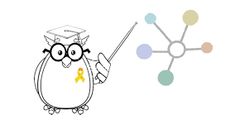
|
| 김현 한국학중앙연구원 인문정보학 교수 |
목차
[숨기기]
1. Introduction
Humanities education and research activities in the post-human era are called "Digital Humanities."
This lecture is intended to suggest from the perspective of "Digital Humanities" how our cultural activities of exploring and studying traditional cultures can become richer without withering in the post-human era.
2. Post-human
What is Post-human
This illustration that you've seen a lot shows the evolution of mankind. Human evolution will not remain in the present but will continue. The part marked by the question mark is the future human - post-human, which will be defined differently from the present human.
|
post-human is one of the themes of today's newly launched social, cultural, and academic discourse. This does not yet have a generally accepted definition, and there is much discussion in the fields of philosophy, literature, art, engineering, and social sciences. However, a common background for these discussions is the perception that the environment in which humans live today has changed and that change will accelerate rapidly in the future. |
Post-human and AI
There is a lot of discussion about the changes in the post-human era. One of the main topics of the discussion is "artificial intelligence (AI)." post-human in the future will be human beings living with artificial intelligence.
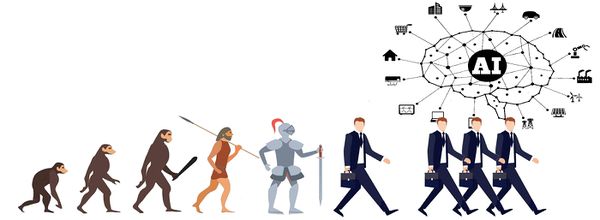
How will Humans Evolve in the Future?
3. AI and Cultural Heritage
Cultural Heritage in the AI World
Artificial intelligence is already affecting human lives in many areas of our society. Finance, transportation, healthcare, shopping ...... Those influences will be even greater in the future.
By the way, there are certain areas that are still being left out of this artificial intelligence world. One of them is the cultural heritage of the past that all of us gathered here are deeply interested in.
Why? Most of what happens in modern society are managed and recorded through computer systems. So everything leaves a trace of "data," and that data comes together to form artificial intelligence.
However, most of the cultural heritage of the past remains analog materials or records, so computers cannot understand them and use them as data for artificial intelligence.
Do you question whether cultural heritage should be addressed in the world of artificial intelligence? It is human to enjoy cultural heritage, but if the knowledge and information about it are not migrated to the computer-readable data, the valuable asset will be increasingly forgotten in the post-human era.
Misguided ideas about AI
The wrong idea about artificial intelligence is to perceive it as a confrontation against human beings. It is a similar idea that the workers regarded steam engines as an enemy threatening their survival during the First Industrial Revolution.
Artificial intelligence can learn and improve its intelligence only through human-supplied data.
If humans provide distinct and meaningful raw data, artificial intelligence will make reliable decisions and help humans.
On the contrary, if humans provide AI with inaccurate knowledge, ambiguous information, and wrong data, AI will be forced to make wrong decisions, and it will be harmful to humans.
Learning Cluture in post-human Era
How can we properly teach AI, which will be a partner of post-human, with the knowledge that is meaningful and valuable?
Until now, humans have expressed cultural knowledge in a way that only humans can understand: Languages, sounds, movements that only we humans can understand.
By converting this information into something that computers can understand and interpret, computers can develop into something that helps us a lot more.
So far, the way we study humanities has been to read the text written in the book, understand the context, and write a new text.
In the post-human era, we must have the ability to read and interpret knowledge written in "data" and the ability to express our own discoveries and thoughts with "data." Because that is how we share knowledge with the world.
Digital Humanities is the study of how to transform cultural knowledge into digital data that can be shared with artificial intelligence (and therefore, how to share and utilize it with more people).
An Example of Digital Humanities Data
- Semantic Database: The World of Korean Buddhist Heritage
4. Digital Humanities
What is Digital Humanities?
☞ "Digital Humanities" refers to the conduct of humanities research and education in the digital environment, as well as the effort to spread and utilize the achievements of such research in our society.
Digital Humanities does not merely mean digitizing humanities materials or publishing research results in a digital format.
It means developing more creative humanities endeavors in an information technology environment.
It also includes efforts made to advance the reproduction of humanities knowledge in more innovative ways through the communication facilitated by digital media,
Educational Issues of Digital Humanities
One expression referring to today's younger generation is the term "digital natives." It refers to people who have grown up in a digital environment since they were young, communicating digitally and expressing digitally.
When they act as the mainstream of this society, the world will be much different from it now: Everything will become much more digital.
It is not just the content that exists as tangible objects, such as toys, books, or music records, that is being transferred to the digital world. The act of using and enjoying the object is also moving into the digital world.
Searching for and reading digitized text on the Internet instead of reading a paper book is just an intermediate aspect of the changing picture. Even the process of discovering more meaningful elements in the contents of the text and exploring new knowledge in the direction of his curiosity will be done by manipulating data in the digital world.
"Digital Curation" is practiced as a digital literacy education for the digital natives, cultivating the ability to combine and organize the elements of knowledge to get answers to problems and open the doors to the world of new knowledge.
5. Digital Curation
What is Digital Curation?
☞ self-directed exploration and representation of knowledge in the digital environment
Just as a museum curator engages in curation by finding and connecting diverse information related to an individual artifact to expose its cultural value, The Digital Humanities scholar engages in the curation of knowledge by connecting the elements of humanities knowledge in a digital environment and broadening the world of that knowledge.
A New Method for the Convergence of Humanities and Arts
As a cultural study activity, students survey various pieces of knowledge through internet surfing and combine them into a data network, and turns them into stories.
The result of digital curation is not just the knowledge that only remains in their memory, but online content that they can show to others, and share with more people. This, together with the students' musical performances, becomes their own creation, opening the way for them to express themselves in the digital world.
An Example of Digital Curation
- Yeon-ga and Pokarekare Ana: An Intangible Cultural Heritage Shared by Two Countries
6. Conclusion: The Task of Digital Humanities to prepare for the Post-human Era
☞ Describing the knowledge as "data" in the process of exploring humanities, and thus enabling it to be used in various areas of human society.
The primary concern of digital humanities is to create "small data" that contains "human stories" that have been meaningful in our history and culture, and to create an open way of communication that allows the small stories to become "big data."
Digital curation is a way to study humanities in a digital environment and an effort to convert traditional humanities knowledge into "data" that can communicate in the digital world.
Through these efforts, our humanities knowledge will be meaningfully activated in various areas of post-human society beyond the boundaries of traditional humanities.
